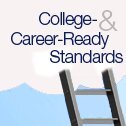The textbooks used in teacher education do not adequately promote all the tenets of good classroom instruction, the National Council on Teacher Quality contends in a new report.

In a survey of 48 commonly used textbooks, NCTQ examined how comprehensively each book covered important instructional tenets. The standards for instruction used for the analysis were those set forth by the Institute of Education Sciences in a 2007 meta-analysis, “Organizing Instruction and Study to Improve Student Learning”:
- Pairing graphics with words.
- Linking abstract concepts with concrete representations.
- Posing probing questions.
- Repeatedly alternating problems with their solutions provided and problems that students must solve.
- Spacing learning over time.
- Assessing to boost retention.
“Looking for the six strategies in these textbooks is akin to looking for six needles in a haystack,” the authors wrote.
The textbooks were pulled from randomly selected educational psychology, general methods, and subject-specific courses for which NCTQ had full sets of syllabi. Two analysts read every book and extracted “any text related to each of the six strategies.” Those selections were then reviewed by an independent researcher. The authors decided that a book covered a topic based on answers to these three questions:
- Does the text present most of the key concepts necessary to understand the strategy?
- Does the coverage of the strategy present a consistent message?
- Is each strategy presented in a way that conveys its universality?
Of all strategies, “posing probing questions” got the most coverage.

As is the case with reviews of this nature, the project uses a subjective approach to whether a textbook meets NCTQ’s coverage standards. For example:
Although Gunter, Estes, and Mintz’s Instruction: A Models Approach states, ‘Periodic review of the material should be built into every instructional plan,’ the authors do not define “periodic” or give recommended (or not recommended) examples of the appropriate interval between exposures. Given that appropriate intervals are generally much longer than anyone would guess (weeks or months, rather than days), teacher candidates need more explicit guidance on how to schedule practice.
As to why textbooks might not align with research, the NCTQ authors suggest “that the neglect stems from the fact that publishers use less demanding standards than the IES in choosing textbook content.”
There are plenty of potential downfalls to the NCTQ approach, though. First, the analysis assumes that professors aren’t supplementing the books with in-class instruction or on-the-job. (NCTQ rejects that line of thinking, saying that an examination of the 219 courses’ syllabi shows a strong correlation between classwork and the textbooks.)
A larger issue—and it’s one that came up with its larger review of teacher preparation beginning in 2012—is that the NCTQ is using standards that many in the teacher education world might disagree with. Many of the books were published before the 2007 Education Department report (although NCTQ’s authors said they looked at six updated textbooks and found few improvements in those). Beyond that, the authors of the textbooks probably didn’t set out to cover all these standards in the first place. As the NCTQ project also notes, it’s not that the information in the books is useless or bad—it just isn’t matching what the NCTQ is looking for.
An Author’s Vigorous Dissent
NCTQ invited all publishers to respond to the paper, or forward that invitation to the respective authors. One such author did respond: Harry Wong, author of The First Days of School. In his letter, Wong protested his book’s inclusion in the review at all, saying that his book “is on organization and consistency, not on instruction.” he continues:
Although the six recommended organizational instructional strategies are important, The First Days of School addresses instruction based on the preeminent research of John Hattie. John Hattie’s research is titled Visible Learning and is the result of 15 years of research and synthesises of over 800 meta-analyses (over 50,000 studies and 250+ million students) relating to the influences on achievement in school-aged students. It presents the largest ever collection of evidence-based research into what actually works in schools to improve learning.
In a response, NCTQ president Kate Walsh, who co-authored the report, said that because two sections of one chapter of Wong’s book dealt with instructional strategies, the entire book was fair game for review.
The NCTQ is funded by a variety of groups including some, like the Bill and Melinda Gates Foundation and the Joyce Foundation who are proponents of teacher-prep reform. (Both have supported coverage of various topics in Education Week.)
Image via NCTQ
For more on teacher preparation: